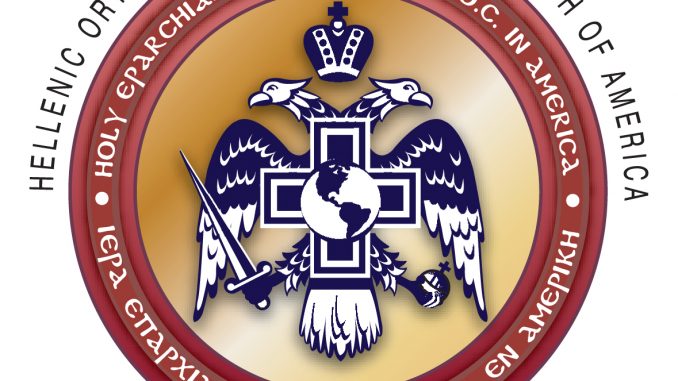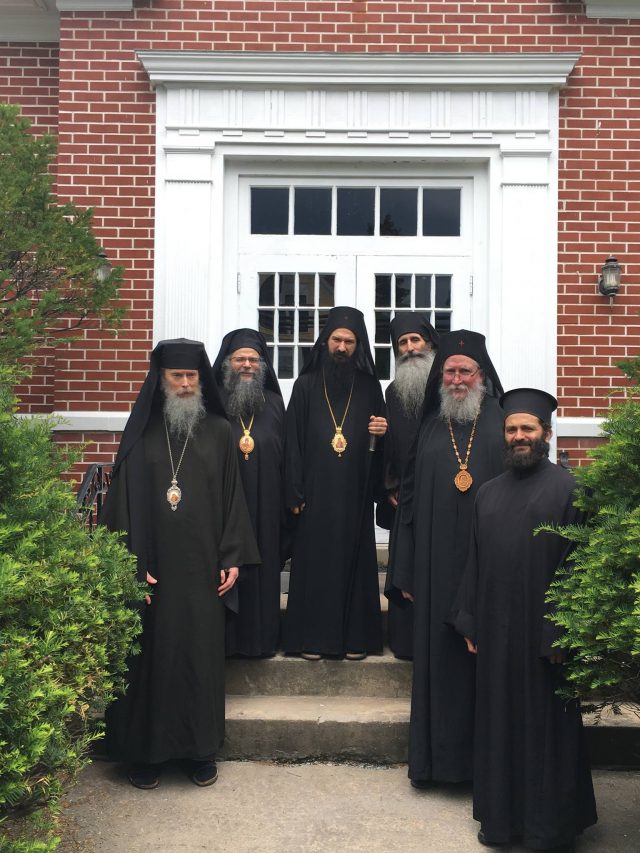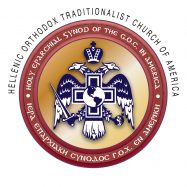
Hellenic Orthodox Traditionalist Church of America
Holy Synod of the G.O.C. in America
March 7/20, 2020
The Holy Hieromartyrs of Cherson
Protocol no. 2020-2
Beloved Clergy and Faithful,
This letter is a follow-up to the recently published and translated encyclical of the Holy Synod in Greece regarding the Coronavirus (Greek original; English translation).
That document, which we advise all the faithful to read carefully, laid down the foundational principles for an Orthodox understanding of how to face this great trial. Nevertheless, since some of its provisions relate specifically to the situation in Greece, His Eminence, Metropolitan Demetrius, convened an extraordinary session of the Eparchial Synod of America, which met for some two hours on Wednesday, March 5/18, 2020 to discuss the complex and rapidly evolving COVID-19 pandemic and the peculiar circumstances we face in each Diocese of the Americas. Despite the variations in local situations, we, the Hierarchs of the Eparchial Synod, resolved to express the following to our flocks, as an addendum to the aforementioned encyclical:
1. The race of man in its fallen and unregenerate state is continually forgetful of the Divine Providence which watches over us. Instead of directing our gaze upward to the heavens, we voluntarily prefer the passing material delights of this age. We repeat in ourselves the sin of Adam and are dragged ever further into the pit of iniquity. Believing the lie of the serpent that we can become like gods, we become convinced that we control our world and our destinies, and that we are entitled to endless pleasure and privilege. Yet God, in His love for mankind, from time to time sends us reminders that from dust we came and to dust we shall return. These reminders often take the form of immense natural disasters. Such catastrophes clearly show us that hope in the delights of this world is but vanity, and that there is only one thing we possess which is enduring, namely, our immortal soul. We are called to redirect our minds to eternal realities, to recall that the only thing we shall carry out of this fleeting life are the virtues we have acquired, and that therefore we must redouble our spiritual struggle. Moreover, the Lord allows these chastisements in order for us to turn to Him in repentance, to purify us like gold in the crucible, and to see whether we shall prove our Christian love in active deeds of charity towards our brethren who are suffering.
2. The foundational principle of our life, welfare, and salvation as Orthodox Christians depends upon our Mysteriological union with the Theanthropic Body of our incarnate God, Jesus Christ the Word. That union is effected through Baptism, Chrismation, and the continuing reception of the “medicine of immortality,” the Holy Eucharist, which ingrafts and secures our membership in the “extension” of our Lord’s incarnation in His world, the Holy Orthodox Church, which we also know to be His Body and identical to the Body our Lord received from the Most Holy Theotokos and imparts to us in Holy Communion. Our clergy and faithful alike, then, have an indispensable obligation to affirm their belief in our Incarnate God and their ingrafting and abiding in His Holy Body, the Church, through their regular participation in the Mystery of the Holy Eucharist. Whatever we do to address any world crisis must not violate these beliefs or undermine this holy work of the people of God and thereby cut off our access to our Lifeblood.
3. We acknowledge that the threat of contagion from the coronavirus is severe. Not only do those who contract the disease risk severe illness or death, but our medical institutions may be overwhelmed by a rapid spread of infections, crippling or paralyzing the health system in the process, such that proper care is unavailable both to coronavirus victims and to those suffering from unrelated but severe disease. Furthermore, the cascading effects of the virus and the abrupt stalling of our economy threaten the low-income families that constitute the majority of our population with all of the hardships associated with a financial recession: the closing of businesses, the loss of employment and income, eviction or foreclosure, cancellation of medical insurance and loss of care and medication, disenrollment from schools, psychological stress and illness, the breakup of families, and so forth.
4. Accordingly, beyond our duty to obey the laws of the land (insofar as they do not contradict our Faith), we also see it as a fulfillment of our love of neighbor and our civic duty when we comply with measures meant to slow or stall the spread of this disease. Such measures, focused both on the limiting of socialization and on hygienic practices, are not designed to harm the Christian Faith. Rather, they aim to prevent a massive overwhelming of our healthcare system—a genuine risk with this highly contagious and virulent pathogen—and, thereby, to assure that the doctors, nurses, and professionals who minister to the ill can fulfill their oaths to preserve life and to minimize suffering. We offer our full compliance with the understanding that at the earliest opportunity freedom of religious assembly and practice will be reinstated, and that the exceptional circumstances of these unusual strictures means that they are not intended to undermine the rule of freedom of conscience and religion.
5. We acknowledge that every parish will have different circumstances and challenges and we prayerfully exhort all to strive to work out the details of these challenges in a harmonious manner, guided by your local bishop and priests.
6. In accordance with the general principle of compliance with local regulations, we affirm the Holy Synod’s directive that non-liturgical parochial interaction (e.g., fellowship hours, meals, and other gatherings) should temporally be suspended.
7. If assemblies for the celebration of the Divine Liturgy are limited to a certain number of attendees, clergy should consider, in consultation with their Hierarch, practical measures that assure regular participation in Holy Communion. These could include rotating attendance at successive Liturgies by the faithful, travel to other smaller congregations, or a Priest staying on duty for a prolonged period after the Liturgy and allowing faithful to come to pray and Commune individually. By implementing this latter practice, a Priest could even celebrate the Divine Liturgy with a core staff (e.g., servers and chanters) and then slowly Commune his entire congregation piecemeal as they come in at their assigned times, without ever assembling more than a few people at once. In this context it would be appropriate for some of the hymns of the day to be chanted by each group of people, so that all are able to participate to some extent in the Services of the Church. The partaking of the Divine Mysteries must always be accompanied by prayer, without which we risk Communing in an unworthy manner.
8. Wherever regulations against public assembly are in force, and as the Holy Synod has advised, all Services besides the Divine Liturgy should provisionally be suspended. During the hours when such suspended Services would normally be held, in their homes the faithful should make every effort either to conduct reader services or to avail themselves of recordings or live broadcasts. These broadcasts are now available from our Holy Monasteries.
9. Every effort should be made to clean and disinfect handled surfaces in the Church and its associated buildings. Churches should ensure that they have an adequate supply of cleaning materials, and that someone is appointed to wipe the Icons with disinfectant after they have been venerated. People should be encouraged to observe proper distances from one another and to restrict embraces or kisses. Only antidoron (not wine) should be offered after communion. Those who are ill or who have pre-existing health conditions which place them at risk should be encouraged to stay home, where, when appropriate, clergy can visit to Commune them individually.
10. The faithful should not forget that it is for our sins that our the Lord allows afflictions and illnesses. It is, then, not accidental that this trial comes during Lent, which is the season of repentance. Let us resolve to be more diligent in our self-examination, repentance, prayers, and works of mercy, that we might purify our souls and adorn them with virtue. In this way, at the conclusion of our fast, we will welcome our Lord well prepared and with a clean conscience, as the wise virgins did the Bridegroom.
11. Since our Lord allows trials out of His love for mankind, let us not neglect charity. As the crisis continues to unfold, there will be no lack for opportunities to show mercy and compassion to those in need. In the rampant anxieties and fears that spread through our society even more quickly than the virus itself, we will face continuing temptations to depersonalize one another and turn in on ourselves. We must conscientiously apply ourselves to resist these natural temptations. Perhaps, with some irony, we can now turn the tables and use the same devices (e.g., smart phones) that once plunged us into virtual worlds to maintain our connections with and love and concern for those whom we can no longer freely visit. We should make conscious efforts to communicate in a compassionate manner with the world that is now “quarantined” around us. The young, who are less susceptible to serious complications, ought to be solicitous to assist the aged; the healthful should offer aid—perhaps in the form of shopping or running errands—for those who are infirm. The local parishes should coordinate to offer services for the parishioners who are in the greatest difficulty. Meanwhile, those who are left at home without work or school should avoid the temptation to binge on television and surfing the Internet, and should instead dedicate themselves to prayer, reading, and spending quality time with family members.
12. Finally, we urge people to give practical thought to their struggling local economies. Whenever possible, we should purchase takeout food or other redesigned services implemented by local businesses that are struggling to stay afloat. Empathy and love should prompt such concern and actions.
Let us redouble our prayers for one another and our acts of mercy, so appropriate for this holy season, that our Lord will help us and those around us to withstand this trial.
With every humble blessing and continuing intercessions before our Savior, we remain
Your humble servants,
† Metropolitan DEMETRIUS of America
and the Members of the Holy Eparchial Synod
† Metropolitan PHOTIOS of Demetrias
† Metropolitan MOSES of Toronto
† Bishop AUXENTIOS of Etna and Portland
† Bishop CHRISTODOULOS of Theoupolis
† Bishop MAXIMUS of Pelagonia





